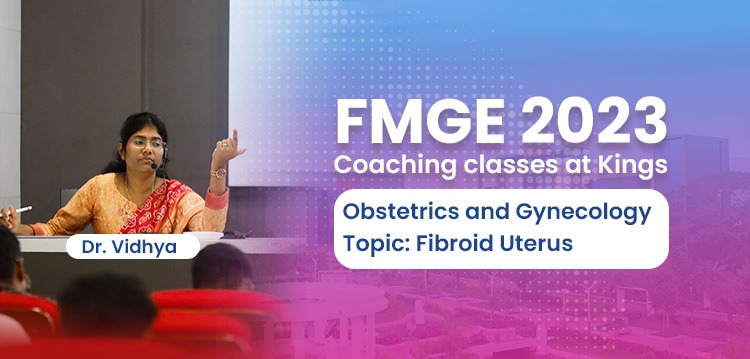
Best Coaching Centre for FMGE 2023
Kings International Medical Academy is widely recognized as a premier coaching institute for medical students preparing for the Foreign Medical Graduate Examination (FMGE) in India. With a reputation for providing excellent training and guidance, KIMA has helped countless students achieve their dreams of becoming successful doctors.
> As part of their commitment to offering the highest quality education, Kings recently invited Dr. Vidhya, an eminent expert in the field of Obstetrics and Gynecology, to deliver a session on Fibroid Uterus. Dr. Vidhya's vast knowledge and experience in this area made her the perfect candidate to teach the students at Kings and her insightful lecture left a lasting impression on all those in attendance. Let’s learn about Fibroid Uterus in a bit more detail, shall we?
FIBROID UTERUS
BENIGN tumour, DISORGANIZED/POOR blood supply
Arise from SMOOTH MUSCLE CELL OF MYOMETRIUM
TRANSLOCATION 12 - 14 >>> Deletion of chromosome 6
| Risk factors | Clinical factors |
| Early menarche Late menopause Nulliparity Family Hx Every estrogen inc conditions: PCOS, endometrial CA/Hyperplasia, obesity, gall stone, endometriosis, metabolic syndorme |
>50% - asymptomatic
If sx: MC Sx: MENORRHAGIA
|
Types:
| FIGO classification of Fibroids - 9 subtypes (0-8) | ||
| Score | Score 1 - 6 INTRAMURAL
|
|
| 0 | Completely submucus / Intracavitary | |
| 1 | >50% submucosal + <50% intramural | |
| 2 | >50% intramural + <50% submucosal | |
| 3 | Intramural + touching cavity | |
| 4 | Intramural + not touching cavity | |
| 5 | >50% intramural + <50% subserosal | |
| 6 | >50% subserosal + <50% intramural | |
| 7 | Completely subserosal | |
| 8 | Cervical and Broad liagment | |
| Fibroid types: based on LOCATION | ||
| Cervical fibroid | Broad ligament F | Subserous fibroid |
| POSTERIOR CERVICAL FIBROID. (obstruct urethra) Urinary retention, urgency, frequency Infertility “LANTERN ON DOME OF ST PAUL’s CHURCH” ANTERIOR CERVICAL FIBROID - doesn’t cause any symptoms | Hydroureteronephrosis Complicated by Polycythemia “MYAMATOUS ERYTHROCYTOSIS SYN” | Detach from uterus n goes into circulation “WANDERING FIBROIDS” “PARASITIC FIBROID” |
| * Submucous - least vascualr; most degenerative Subserous - Most vascular ; least degenerative | ||
Degenerations types:
Special Features:
All type of degeneration MC seen in: SUBMUCOUS
Except: CALCAREOUS (MC in SUBSEROUS)
CALCAREOUS - Peripheral to Centre
All other: Centre to Peripheral
RED - PAINFUL
Others: painless
RED degeneration: MC in PREGNANCY (2nd Tri)
MC Sx: PAIN ABDOMEN
Special Fea: BEEFY RED/FISHY ODOR Hemorrhage in Myoma
Others: Fever, vomiting, inc WBC, ESR (non infective etioloogy)
Ddx: Abruption, preterm labor, appendicitis, Cholecystitis, Pyelonephritis
IOC: <12 wk: TVS >12 wk: Transabdominal US
Tx: Symptomatic (NSAIDS, Antibiotics, fluids)
For all fibroid:
Gold standard: MRI (d/f b/w fibroid n adenomyosis
Mx: Expectant/medical/surgical
Expectant Mx: OBSERVE in
Surgery: MYOMECTOMY or HYSTERECTOMY
Choose either based on family completion
DEFINITIVE THERAPY - both
Recent advances:
1. Uterine artery embolisation - POLYVENYL ALCOHOL inside UTERINE artery. (don’t use if desire future pregnancy)
2. MRI guided focus ultrasound HIFU - High intensity focused ultrasound
MEDICAL MX: CONTINUOUS GnRH analaogue
GnRH antogonists
Mifepristone - Progesterone receptor antagonist
Progesterone receptor modulator (ULIPRISTIL)
ASOPRISNIL
Mirena & Progesterone - REDCUE BLOOD LOSS (symptomatic relief but make fibroid grow)
All others: SHRINKS FIBROIDS
Other not in use: androgen analogue (Gestrinone), Danazol
| GnRH analogues | GnRH Antognists |
| Downregulate pituitary receptors if given continuously (+) FLARE EFFECT (1st one wk) DEPOT preparation AE: OSTEOPOROSIS irreversible Drugs: Leuprolide, Naferelin, Triptorelin, Goserelin *should not be used for more than 6 months | Block GnRH receptors directly (-) No flare effect DAILY INJECTION Drugs: ABARELIX, DEGARELIX |
MIFEPRISTONE: RU486
Used for: MTP, FIBROIDS, Cushing syn, cervical ripening, also ectopic pregnancy (but DOC
for ectopic: METHOTREXATE)
For MTP: 200mg single shot
For Fibroid: 20-30mg/day
A/E: vASOMOTOR syndrome, Endometrial hyperplasia/cancer
Ulipristil:(SPRM/Asoprisnil) -30mg/day--SHRINKS FIBROIDS
A/E: vASOMOTOR syndrome, Endometrial hyperplasia/cancer
| CHORIOCARCINOMA CHORIOCARCINOMA: MIXED germ cell tumor Arise from -- Chorionic epithelium 3-5% are a/w with MOLAR pregnancy Primary site: usually anywhere in Uterus (Secondary involvement) Rarely starts in Ovary / tube Type: Localized Nodular Highly vascular Route of metastasis: Hematogenous Metastasis sites: LUNGS (MC), ANTERIOR vaginal wall, Brain, Liver Histology: ADIMORPHIC population of SYNCYTIOTROPHOBLAST and CYTO-trophoblast Secretes: Large amount of HCG (tumor Marker) Symptoms: Irregular vaginal bleeding (brisk), continued amenorrhea Lungs: Cough, Breathlessness, hemoptysis Cerebral: Headache, convulsion, paralysis, coma Liver: Epigastric pain, jaundice Chest X-ray: CANNON BALL shadow, SNOW STORM (d/t numerous tumour emboli) |